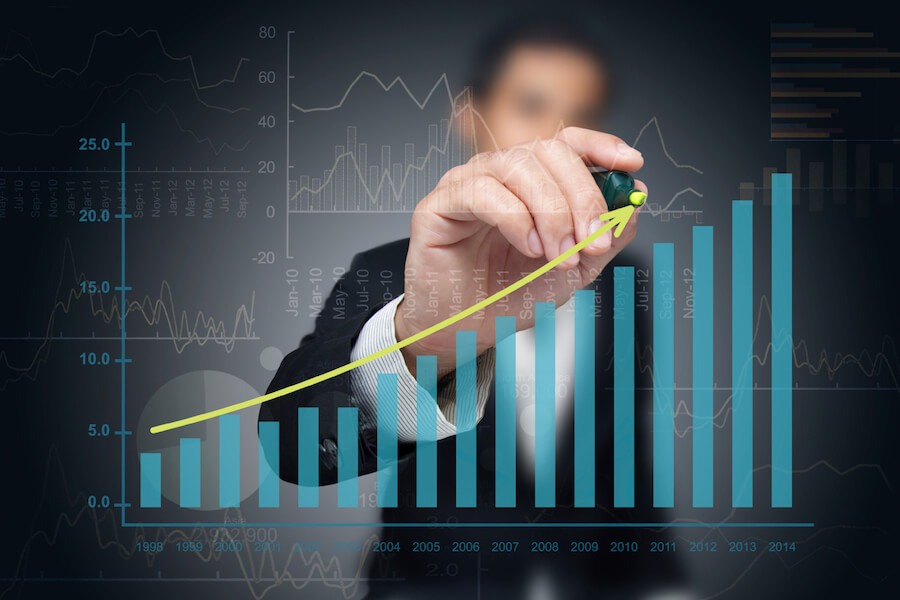Trends
Read and Think
-
Anything, Anywhere, Anytime
 The digital age has ushered in more than just advanced technology. The advent of wireless devices, cloud computing, virtual servers and applications, blockchain and virtual reality technologies, as well as ideas incubating at the University level and Palo Alto garages, is changing society in myriad ways and at light speed. These changes impact all facets of our daily lives, from transportation, communication and work environment, to economics, education and warfare. Such change and progress is accompanied by both opportunity, as well as pitfalls. Investors will be challenged to understand the intricacies of such advanced technologies, and just as importantly, its long term impact on companies, industries and society in general. The race used to belong to the swift, it now belongs to the swift, knowledgable and thoughtful.
The digital age has ushered in more than just advanced technology. The advent of wireless devices, cloud computing, virtual servers and applications, blockchain and virtual reality technologies, as well as ideas incubating at the University level and Palo Alto garages, is changing society in myriad ways and at light speed. These changes impact all facets of our daily lives, from transportation, communication and work environment, to economics, education and warfare. Such change and progress is accompanied by both opportunity, as well as pitfalls. Investors will be challenged to understand the intricacies of such advanced technologies, and just as importantly, its long term impact on companies, industries and society in general. The race used to belong to the swift, it now belongs to the swift, knowledgable and thoughtful. -
Climate Change
 Its causes may be up for debate, but climate change is upon us and will impact investors for years to come. Changing weather patterns impact such things as food production, infrastructure needs, energy development, migration, water availability and transportation, to name just a few. These challenges will transcend economic considerations and spill over into the political, security and human capital arenas. Expect the global discussion and debate to intensify as emerging economies assume a larger role in consumer consumption and energy production and use. The latter will be front and center as such economies consider the pros and cons of generating power via nuclear, coal, oil, gas, solar and wind. Each of these sources have its selling points and challenges, as well as distinct political considerations. Change is in the air -- watch, read, listen and consider before investing.
Its causes may be up for debate, but climate change is upon us and will impact investors for years to come. Changing weather patterns impact such things as food production, infrastructure needs, energy development, migration, water availability and transportation, to name just a few. These challenges will transcend economic considerations and spill over into the political, security and human capital arenas. Expect the global discussion and debate to intensify as emerging economies assume a larger role in consumer consumption and energy production and use. The latter will be front and center as such economies consider the pros and cons of generating power via nuclear, coal, oil, gas, solar and wind. Each of these sources have its selling points and challenges, as well as distinct political considerations. Change is in the air -- watch, read, listen and consider before investing. -
Global Population
 According to United Nations projections, 2016 represents a milestone -- for the first time since 1950, the world's advanced economies will see a decline in their combined working-age populations. The projections expect a 5% shrinkage by 2050. Essentially the byproduct of two long term trends: increasing lifespans and decreasing fertility, the resultant demographics will impact consumption, employment, income and growth. For example, as baby boomers head into retirement, there's concern that certain occupations will suffer from both lack of qualified workers and the brain-drain associated with such departures. The absence of knowledge transfer from older to younger employees can impact companies, as well as entire industries. Another example resides in consumption patterns, generally shifting from consumption of goods to consumption of services like healthcare, travel and downsized living arrangements. Experienced investors know that demographics are a powerful trend that can impact many industries going forward. It should be noted that the U.S., given the size of the Millennial generation, is well positioned in the long run as this large demographic asserts itself politically, socially and economically.
According to United Nations projections, 2016 represents a milestone -- for the first time since 1950, the world's advanced economies will see a decline in their combined working-age populations. The projections expect a 5% shrinkage by 2050. Essentially the byproduct of two long term trends: increasing lifespans and decreasing fertility, the resultant demographics will impact consumption, employment, income and growth. For example, as baby boomers head into retirement, there's concern that certain occupations will suffer from both lack of qualified workers and the brain-drain associated with such departures. The absence of knowledge transfer from older to younger employees can impact companies, as well as entire industries. Another example resides in consumption patterns, generally shifting from consumption of goods to consumption of services like healthcare, travel and downsized living arrangements. Experienced investors know that demographics are a powerful trend that can impact many industries going forward. It should be noted that the U.S., given the size of the Millennial generation, is well positioned in the long run as this large demographic asserts itself politically, socially and economically. -
Government Debt & Taxes
 The 2008/9 global financial meltdown resulted in an unprecedented level of monetary easing around the world. Our own Fed's balance sheet ballooned to over $4 trillion, as Japan and the European Union joined the party. Additionally, many state governments here in the U.S. have taken on debt and pension obligations that will be challenging to digest. Add in the long term obligations of social security, medicare and medicade, and you begin to wonder how we'll pay for it all. Traditionally, it has come from two sources: taxation and borrowing. We're not sure where the market-driven boundaries of the latter reside, but suffice it to say that you can't borrow your way to prosperity without growth. What this indicates to us is that taxes are headed higher, which in turn will impact various industries, as well as tax-payer behavior. While not necessarily a bad thing, higher taxes will have important implications in the years to come.
The 2008/9 global financial meltdown resulted in an unprecedented level of monetary easing around the world. Our own Fed's balance sheet ballooned to over $4 trillion, as Japan and the European Union joined the party. Additionally, many state governments here in the U.S. have taken on debt and pension obligations that will be challenging to digest. Add in the long term obligations of social security, medicare and medicade, and you begin to wonder how we'll pay for it all. Traditionally, it has come from two sources: taxation and borrowing. We're not sure where the market-driven boundaries of the latter reside, but suffice it to say that you can't borrow your way to prosperity without growth. What this indicates to us is that taxes are headed higher, which in turn will impact various industries, as well as tax-payer behavior. While not necessarily a bad thing, higher taxes will have important implications in the years to come. -
Healthcare Revolution
 When it comes to healthcare, it's the tale of two cities. On one hand we are witnessing a healthcare revolution as we learn more about the human genome, RNA and its derivatives, the role of proteins and the application of advanced technology to some of our thorniest challenges. The age of individualized medicine is near and will usher in new understandings and therapies that were just pipe-dreams a short ten years ago. While all of this is exciting and undoubtedly leads to investment opportunities, as a country, we are saddled with an antiquated healthcare delivery and payment system that is in need of serious reform. Efforts are underway but investors should not be naive about the political and entrenched industry obstacles to such reformation. However, the trend is inevitable and slowly gaining momentum. To summarize: both cities offer investment opportunities of varying degrees. The former is chock full of richly valued companies grabbing for the brass ring, while the latter has many new entrants, that if successful, will richly reward patient investors.
When it comes to healthcare, it's the tale of two cities. On one hand we are witnessing a healthcare revolution as we learn more about the human genome, RNA and its derivatives, the role of proteins and the application of advanced technology to some of our thorniest challenges. The age of individualized medicine is near and will usher in new understandings and therapies that were just pipe-dreams a short ten years ago. While all of this is exciting and undoubtedly leads to investment opportunities, as a country, we are saddled with an antiquated healthcare delivery and payment system that is in need of serious reform. Efforts are underway but investors should not be naive about the political and entrenched industry obstacles to such reformation. However, the trend is inevitable and slowly gaining momentum. To summarize: both cities offer investment opportunities of varying degrees. The former is chock full of richly valued companies grabbing for the brass ring, while the latter has many new entrants, that if successful, will richly reward patient investors.

Last but not least, don't underestimate the power of the Millennials, born between 1981 and 1997, and some 87 million strong. These digital natives are highly social, determined to make the world a better place, and operate on their own timetable. Larger and more diverse than the baby boom generation, this generation will redefine consumption, politics, media, transportation, relationships and a host of other activities over time. This is not your father's generation!
